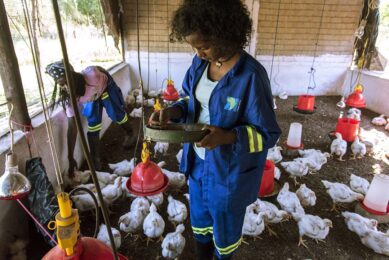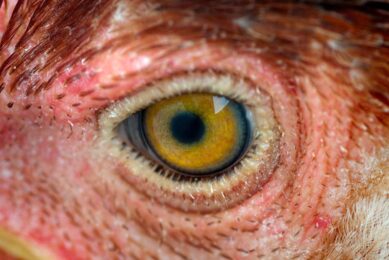Frozen bacteria to replace antibiotics

Russian scientists see huge opportunities to replace antibiotics in poultry feed with 3.5 million year old bacteria from permafrost.
The Bacillius F bacteria that was found in 2012 in the permafrost of the extremely cold Russian province of Siberia can make poultry feeding more efficient by improving the feed conversion rate. That can be concluded from the recent study by Russian scientists from the State Institute of Earth Cryosphere. Bacillius F has the potential to become the source for the production of a new line of immunomodulatory drugs. These have the potential to at least partially abandon the use of antibiotics in poultry farming. A preliminary study on application of bacteria in the feeding of poultry has been conducted by several Russian Institutes of Siberia and Ural Federal Districts.
So far, laboratory tests on mice and preliminary tests on chickens have been conducted and the results are looking very promising. Scientists already developed the formula for drugs which includes the new bacteria and colloidal silver. The drug will be tested in a large-scale study at several poultry farms by the Ural Federal Districts of Russia within the coming years. According to the representatives of the project it will involve “tens of thousands of chickens” and the money for it has already been allocated so it is expected that the study will start in early 2016. Leading researcher of the Tyumen Scientific Center, Andrei Subbotin, commented that the work is being carried out using bacteria found in the depths of Mammoth Mountain in Yakutia, on the right bank of the river Chara. The maximum age of the rocks from which they are extracted, reaches 3.5 million years. It has been revealed that this type of bacteria can survive in permafrost for hundreds of years. It is activated and starts growing at temperatures higher than 5°C. “We are not 100% sure that this is an ancient, relict bacteria we are dealing with. Because the frozen ground is permeable, it could be of more recent date. Our hypothesis is that the bacteria in the permafrost are not in suspended animation, but are in a so called state of hypometabolism. This means they continue to function,” he stated.
Bacillius F improves feed conversion ratio and average daily gain
The synopsis of the study says the injection of Bacillius F has brought strong benefits to metabolic processes and the immunity of trial animals. “It has been confirmed that the injection of Bacillius F has a positive impact on some indicators regarding quality of life, especially in old animals.
First and foremost, this concerns immunity and in particular the speed of activation of the immune response. This would make the Bacillius F drug interesting for use in the constant fight against dangerous pathogens, such as salmonella or MRSA,” according to the representatives of the research team.
In addition, Russian scientists examined mice that were injected with Bacillius F, using magnetic resonance imaging and found that injections affect two types of mediators: glutamate and taurine, which have immunoregulatory abilities and affect the life span of cells. “The first one is responsible for psychostimulation, the second one influences the energy processes in the organism of trial animals,” explained scientists. The study shows that the metabolism of vaccinated animals accelerated. After treatment with the bacteria it temporarily jumped by 20-30%, compared to the level before injection. Scientists believe that in poultry farming it may positively affect the feed conversion ratio and the average daily gain of poultry.
New findings can be a game shifter for the Russian poultry industry.
“The preliminary tests showed the temporary improvement of the immune response which significantly decreases the chance of poultry contamination with the most widely spread pathogens. However, so far this effect isn’t sufficient enough to replace the use of antibiotics in feeding altogether, but we expect that a mix of these bacteria with other anti-microbial substances, in particular colloidal silver, will make it possible to decrease the use of antibiotics. We expect a decrease of antibiotics use in poultry by 30-40% compared to the current amount. This will be a substantial contribution to the fight of modern medicine against growing microbial resistance,” stated the representatives of the project.
At the same time, earlier experiments on mice have also shown that the injection of bacteria brings a wide range of health benefits for birds, in particular it prolongs their lives and protects them against age-related blindness. Anatoly Barshukov, who was engaged in the studies, said he was amazed by the effects produced by Bacillius F after the introduction of bacteria into the muscles of mice and organism.
Nadezhda Mironova, a spokesman for the Institute of Chemical Biology in Novosibirsk, which also participated in the study, said: “We had a control group of mice with the average life expectancy of 589 days. After intramuscular injection of bacteria to another group of rodents their life expectancy increased by 308 days. So on average, they lived 906 days,” she stated.
Results important for Russia’s poultry industry
According to Andrei Subbotin, Bacillius F so far is poorly-studied by scientists and further examinations are needed to fully assess its potential benefits for use in feeding of agricultural animals. At the same time, there are a number of different areas, where can be applied. Subbotin is currently working on the development of immunomodulatory drugs, not only for agricultural animals, but also for some grain species. “These drugs can help plants overcome the stresses associated with the peculiarities of climate and ecology, so it will have a positive impact on productivity.” The laboratories of the Tyumen Scientific Center noted some positive results in experiments with heat-loving plants – such as corn.
Scientific-innovative biotechnological centre ‘Crops’, in conjunction with the Agricultural Research Institute of Northern Zauralye, already started to develop a number of immunomodulatory drugs which in the future may enable Russian companies to grow corn in parts of central Russia and Siberia where previously the harsh climate made the cultivation of such crops almost impossible. Scientists believe that studies like these can bring huge benefits to the country’s feed industry. The new findings are very important for the future of Russia’s livestock industry, which faces a threat of microbial resistance and appearance of super bugs due to large scale use of antibiotics. Numerous reports show that due to the lack of control on the Russian market, the rate of the use of feed antibiotics in Russia is exceeding the average European usage by 15-40%, depending on regions and farms.
Large bags of antibiotics still used on a regular basis in Russia.
Russian authorities have started to take steps to deal with the problem. The State Duma (Low chamber of Parliament) is currently considering a law which will exclude antibiotics from the list of OTC drugs. Also, the Russian government has been working on the improvement of the veterinary control system on the domestic market to decrease the use of feed antibiotics. Experts believe that Russian veterinary bodies have not succeeded in this area thus far.
Join 31,000+ subscribers
Subscribe to our newsletter to stay updated about all the need-to-know content in the poultry sector, three times a week. Beheer
Beheer








 WP Admin
WP Admin  Bewerk bericht
Bewerk bericht